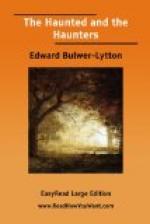snatched the keys from the palsied hands of the infirm
old keeper. “I see,” said his majesty
in a tone of contempt, “that I must finish this
adventure”; and before his terrified suite could
prevent his design, he had already opened the massy
oaken door, and penetrated into the council-chamber,
first pronouncing the usual formula, “with the
help of God.” The companions of his midnight
excursion entered along with him, prompted by a sentiment
of curiosity, stronger on this occasion even than
terror; their courage too was reinforced by a feeling
of shame, which forbade them to abandon their sovereign
in the hour of peril. The council-chamber was
illuminated with an immense number of torches.
The ancient figured tapestry had been replaced by a
black drapery suspended on the walls, along which
were ranged, in regular order, and according to the
custom of those days, German, Danish, and Muscovite
banners, trophies of the victories won by the soldiers
of Gustavus Adolphus. In the middle were distinguished
the banners of Sweden, covered with black crape.
A numerous assemblage was seated on the benches of
the hall. The four orders of the state—the
nobility, the clergy, the citizens, and the peasants,—were
ranged according to the respective disposition assigned
to each. All were clothed in black; and the multitude
of human faces, that shone like so many luminous rays
upon a dark ground, dazzled the sight to such a degree
that, of the four individuals who witnessed this extraordinary
scene, not one could discern amidst the crowd a countenance
with which he was familiar; the position of the four
spectators might have been compared to that of actors,
who, in presence of a numerous audience, were incapable
of distinguishing a single face among the confused
mass. On the elevated throne whence the monarch
habitually harangued the assembly of the States, was
seated a bleeding corpse, invested with the emblems
of royalty. On the right of this apparition stood
a child, a crown upon his head and the sceptre in
his hand; on the left an aged man, or rather another
phantom, leaned upon the throne, opposite to which
were several personages of austere and solemn demeanour,
clothed in long black robes, and seated before a table
covered with thick folios and parchments; from the
gravity of their deportment the latter seemed to be
judges. Between the throne and the portion of
the council-chamber above which it was elevated, were
placed an axe and a block covered with black crape.
In this unearthly assembly none seemed at all conscious
of the presence of Charles, or of the three individuals
by whom he was accompanied. At last the oldest
of the judges in black robes—he who appeared
to discharge the functions of president—rising
with dignity, struck three times with his hand upon
an open folio. Profound silence immediately succeeded;
some youths of distinguished appearance, richly dressed,
and with their hands fettered behind their backs,
were led into the council-chamber by a door opposite




